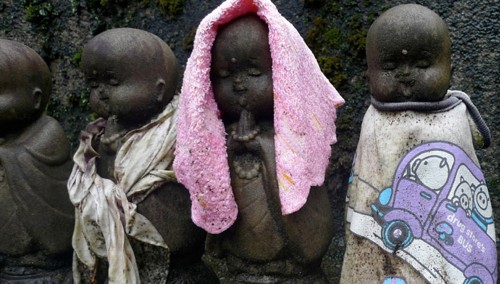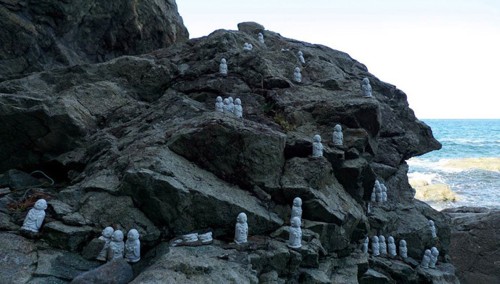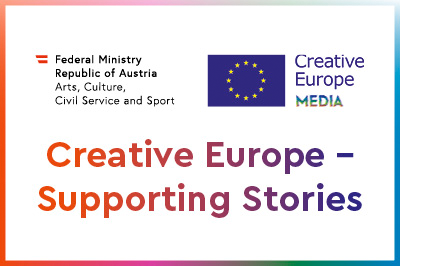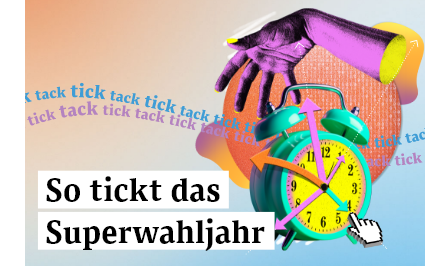Water Children
Schon in den ersten Minuten von WATER CHILDREN hinterfragt Aliona van der Horst die Beziehung mit den Zuschauenden. Dieser Film ist nicht nur ein Porträt der Pianistin und Performance-Künstlerin Tomoko Mukaiyama während der Arbeit an ihrer Multimedia-Installation „Wasted“, für die sie in ihrem Heimatort Tokamachi in Japan unter anderem 12 000 mit Menstruationsblut gefärbte weiße Seidenkleider in einem kathedralhaften Gebilde ausstellte. Er untersucht auch die Beziehung zwischen Subjekt und Macherin – und deshalb unvermeidlicherweise auch jenes zwischen Film und Betrachter*in. Als Dokumentaristin ist van der Horst eine Anhängerin der Beobachtung. Gut möglich jedoch, dass dies ihr persönlichster Film ist. Nicht in dem Sinne, dass er die Macherin selbst zum Thema hätte, sondern in der Form, dass er zu einem umfangreichen Blick auf die andere oder den anderen einlädt. Als Mukaiyama dann an einem bestimmten Punkt beschließt, den Blick zu wenden und sie zu befragen, filmt sie ihre eigenen Hände, was sich beinahe wie eine Verletzung ihrer zerbrechlichen Privatsphäre anfühlt. Ein intimes Bild, das einen atemlos zurücklässt. Mit der gleichen Zurückhaltung hält sie die Aussagen jener Frauen fest, die am Projekt teilnahmen und ihr Menstruationsblut für die Entstehung eines Großwerks über Mutterschaft, Fehlgeburten und die Menopause spendeten. Durch diese suchende, selbstsichere Art des Entdeckens und Blickens dringt van der Horst vor zu einem der möglicherweise immer noch größten Tabus, der Menstruation, und damit auch zu ihren eigenen, bewegend aufrichtigen Gedanken darüber, was Weiblichkeit und Frausein eigentlich bedeuten. „Niemand spricht über das Blut zwischen deinen Beinen. Es ist nicht dasselbe Blut, das wir ständig im Fernsehen sehen. Es ist nicht aggressiv, es ist eine andere Art Blut“, sagt Tomoko Mukaiyama. Der alles durchdringende Charakter und Bachs Musik machen das Anschauen dieses Films zum rituellen Ereignis, fast wie eine Art des Trauerns. Der Titel verweist auf ein japanisches Ritual zum Gedenken an ungeborene – und deswegen unsichtbare – Kinder. (Dana Linssen)
Already in the first minutes of Water Children, director Aliona van der Horst challenges the relationship with the viewer. This is not just a portrait of pianist and performance artist Tomoko Mukaiyama during the making of her multimedia installation “Wasted”, for which she exhibited, among other things, 12,000 white silk dresses colored with menstrual blood in a cathedral-like structure in her native village of Tokamachi in Japan. The film also explores the relationship between subject and maker. And therefore inevitably also that between film and spectator. Van der Horst is a documentary maker from the observational school. But this may very well be her most personal film. Not in the sense that it is about the creator herself, but in the way it invites a generous view of the other. If then at a certain moment Mukaiyama decides to turn the lens, and interview her, she films her own hands, which almost feels like an infringement on her fragile private domain. An intimate image that leaves you breathless. With equal restraint, she records the testimonies of the women who participated in the project and donated their menstrual blood for what became a grand epic about motherhood, miscarriages and menopause. Through that searching and confident way of discovering and looking, she penetrates into what is probably still one of the greatest taboos, menstruation, and thus also into Van der Horst's movingly sincere own thoughts about what femininity and being a woman actually mean. “Nobody talks about that blood between your legs. It's not the same blood we always see on TV. It's not aggressive, it's a different kind of blood,” says Tomoko Mukaiyama. The all-pervading nature and Bach's music make watching this film a ritual event, almost like a kind of mourning. The title refers to a Japanese ritual to commemorate unborn – and therefore invisible – children. (Dana Linssen)
Filmographie Regie (Auswahl)
Gerlach (2023, doc; CE24) - Turn Your Body to the Sun (2021, doc; CE24) - Liefde is Aardappelen (Love Is Potatoes, 2017, doc; CE18 & 24) - 15 Attempts (2013, doc) - Don’t Shoot The Messenger (2013, doc) - Water Children (2011, doc; CE24) - Boris Ryzhy (2008, doc; CE10 & 24) - Voices Of Bam (2006, doc, co-directed with Maasja Ooms; CE24) - A Passion For The Hermitage (doc series, 2006) - Na de lente van ’68 (After The Spring Of ’68, 2001, mid-length doc) - De dame met het witte hoedje (The Lady with the White Hat, 1997, mid-length doc)
Gerlach (2023, doc; CE24) - Turn Your Body to the Sun (2021, doc; CE24) - Liefde is Aardappelen (Love Is Potatoes, 2017, doc; CE18 & 24) - 15 Attempts (2013, doc) - Don’t Shoot The Messenger (2013, doc) - Water Children (2011, doc; CE24) - Boris Ryzhy (2008, doc; CE10 & 24) - Voices Of Bam (2006, doc, co-directed with Maasja Ooms; CE24) - A Passion For The Hermitage (doc series, 2006) - Na de lente van ’68 (After The Spring Of ’68, 2001, mid-length doc) - De dame met het witte hoedje (The Lady with the White Hat, 1997, mid-length doc)
Tribute 2024
Aliona van der Horst
Niederlande 2011
color
75 Minuten
Japanisch / Englisch / Niederländisch OmeU
Screenings / Tickets
Zum Kauf von Tickets klicken Sie bitte auf den gewünschten Termin.
Kamera Aliona van der Horst, Maasja Ooms
Schnitt Aliona van der Horst, Maasja Ooms
Ton/Sounddesign Rik Meier, Leo Erken, Fokke van Saane, Tom Bijnen
Musik Tomoko Mukaiyama
Produzent*innen Frank van den Engel
Produktion
Zeppers Film & TV, VPRO
Österreichpremiere





